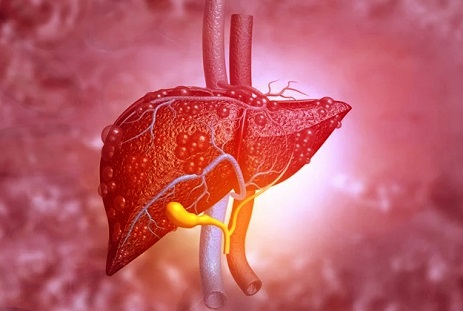Nikhil Prasad Fact checked by:Thailand Medical News Team Nov 17, 2024 1 year, 2 months, 6 days, 18 hours, 13 minutes ago
Medical News: Recent research has brought to light the critical role of tryptophan metabolites in liver diseases such as Metabolic-Associated Fatty Liver Disease (MAFLD) and Alcoholic Liver Disease (ALD). Scientists from the I.M. Sechenov First Moscow State Medical University in Russia and its affiliated institutions conducted an in-depth study to explore how these metabolites impact liver disease progression. This
Medical News report reveals key findings about tryptophan's metabolic pathways and their links to liver health and complications.
 Tryptophan Metabolites and Their Impact on Liver Disease Progression
Tryptophan Metabolites and Their Impact on Liver Disease Progression
The study included 44 patients with MAFLD, 40 with ALD, and 14 healthy individuals. Researchers examined the levels of tryptophan and its 16 metabolites in participants' blood using advanced liquid chromatography and mass spectrometry techniques. The results highlighted the distinct changes in serotonin and kynurenine pathways as liver disease progressed to cirrhosis.
How Tryptophan Metabolism Changes in Liver Disease
Tryptophan, an essential amino acid found in foods like dairy, meat, and grains, undergoes three main metabolic pathways in the body: serotonin, kynurenine, and indole pathways. The serotonin pathway is crucial for mood and clotting functions, while the kynurenine pathway impacts immune responses and inflammation.
In this study, patients with cirrhosis exhibited a significant drop in serotonin levels and an increase in kynurenine levels. These imbalances correlated with the severity of liver disease. For instance, reduced serotonin levels were linked to complications like ascites, jaundice, and coagulation issues, while elevated kynurenine levels were associated with hepatic encephalopathy, a severe brain dysfunction caused by liver failure.
Serotonin's Role in Liver Health
Serotonin, primarily produced in the gut, plays a dual role in liver health. On one hand, it aids liver regeneration and blood circulation. On the other, it exacerbates liver fibrosis in conditions like hepatitis. The study found significantly lower serotonin levels in patients with advanced liver disease, particularly those with ALD. This reduction was associated with markers like the FIB-4 index, a measure of liver fibrosis.
Interestingly, serotonin levels also correlated with platelet counts, suggesting its role in clotting. Patients with cirrhosis and low serotonin levels often experienced hypocoagulation, a condition that impairs blood clotting.
The Kynurenine Pathway and Inflammation
The kynurenine pathway, which metabolizes over 90% of tryptophan, becomes hyperactive in liver diseases due to inflammation. Elevated kynurenine levels were observed in patients with cirrhosis, indicating a shift in tryptophan metabolism. This shift contributed to the production of neurotoxic metabolites like xanthurenic acid, linked to hepatic encephalopathy.
Notably, xanthurenic acid levels were higher in patients with cirrhosis wh
o developed cognitive impairments. This finding aligns with previous research suggesting that metabolites from the kynurenine pathway can cross the blood-brain barrier and impact brain function.
Linking Tryptophan Metabolism to Disease Outcomes
This study established that tryptophan metabolism changes significantly as liver disease progresses. The balance between the serotonin and kynurenine pathways determines various outcomes. For instance:
-Serotonin Pathway: Decreases in serotonin and its metabolites correlated with complications like ascites, jaundice, and coagulation issues.
-Kynurenine Pathway: Increased levels of metabolites like kynurenine and xanthurenic acid were linked to inflammation and cognitive decline.
These findings emphasize the importance of monitoring tryptophan metabolites as potential biomarkers for disease progression and complications.
Implications for Diagnosis and Treatment
The study suggests that tryptophan metabolites could serve as diagnostic tools or therapeutic targets. For example, therapies aimed at restoring serotonin levels might alleviate coagulation issues, while modulating kynurenine pathway activity could help manage inflammation and cognitive impairments.
Additionally, the researchers conducted a Receiver Operating Characteristic (ROC) analysis, which highlighted the diagnostic potential of combining tryptophan metabolites into a metabolic panel. This panel demonstrated high accuracy in differentiating between MAFLD and ALD.
Conclusion
This groundbreaking research sheds light on the intricate relationship between tryptophan metabolism and liver disease progression. By identifying specific metabolic changes, it opens new avenues for personalized diagnosis and treatment strategies. However, further studies are needed to explore the long-term impacts of these findings and develop targeted therapies.
The study findings were published in the peer-reviewed journal: Biomolecules.
https://www.mdpi.com/2218-273X/14/11/1449
For the latest on Liver Diseases, keep on logging to Thailand
Medical News.
Read Also:
https://www.thailandmedical.news/news/study-shows-iberverin-from-cabbage-as-a-potent-ally-against-liver-cancer-cells-by-inducing-ferroptosis
https://www.thailandmedical.news/news/natural-compound-from-waterlily-shows-promise-in-fighting-fatty-liver-disease
